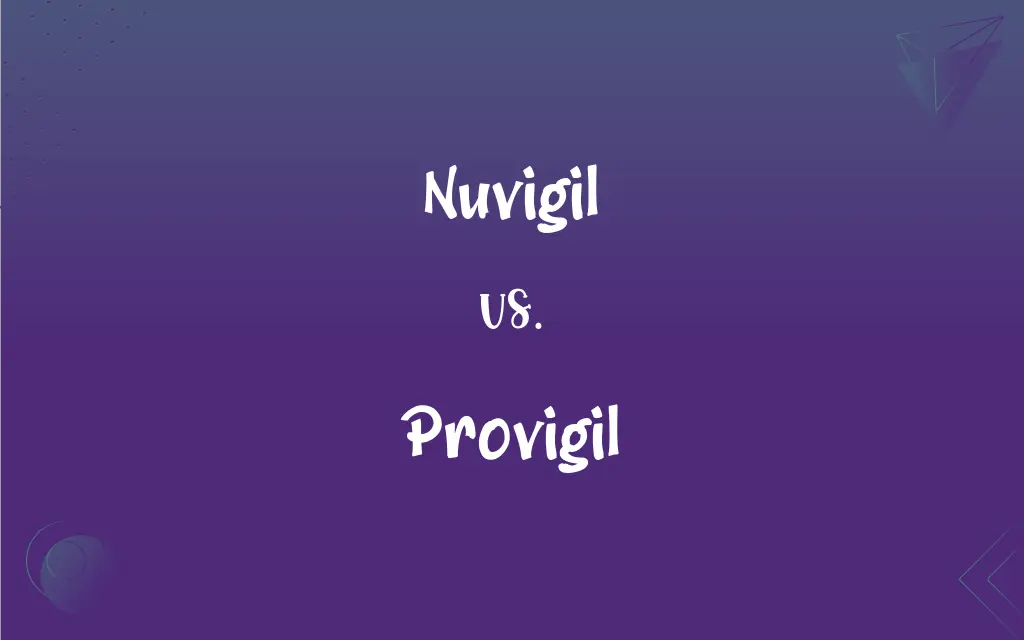Nuvigil vs. Provigil: What's the Difference?
Edited by Aimie Carlson || By Janet White || Published on March 5, 2024
Nuvigil (armodafinil) and Provigil (modafinil) are prescription medications used to improve wakefulness in adults with sleep disorders.

Key Differences
Nuvigil and Provigil are both prescribed for the treatment of narcolepsy, sleep apnea, and shift work disorder, but they differ in their chemical composition. Nuvigil contains armodafinil, which is the R-enantiomer of modafinil, the active ingredient in Provigil. This difference in composition may influence their potency and duration of action, with Nuvigil generally considered to be slightly longer lasting.
Both medications are classified as wakefulness-promoting agents and work by altering neurotransmitters in the brain. However, due to their differences, some patients may respond better to one medication over the other. It's important for individuals to work with their healthcare provider to determine which medication is more suitable for their specific condition.
The side effects of Nuvigil and Provigil can be similar, including headache, nausea, dizziness, and insomnia, but the incidence and severity can vary between individuals. Patients should monitor their reactions to either medication and report any adverse effects to their doctor.
Insurance coverage and cost can also vary between Nuvigil and Provigil. Depending on the patient's insurance plan and the pricing at pharmacies, one may be more cost-effective than the other. It's advisable to explore these financial aspects when considering treatment options.
Both medications are effective in managing excessive sleepiness, the choice between Nuvigil and Provigil should be based on a patient's health history, the severity of their condition, potential side effects, and their response to treatment. Consulting with a healthcare provider is essential to making an informed decision.
ADVERTISEMENT
Comparison Chart
Active Ingredient
Armodafinil
Modafinil
Duration of Effect
Slightly longer compared to Provigil
Generally shorter than Nuvigil
Chemical Composition
R-enantiomer of modafinil
Racemic mixture of R- and S-enantiomers
FDA Approval Year
2007
1998
Dosage Forms
Oral tablet
Oral tablet
ADVERTISEMENT
Nuvigil and Provigil Definitions
Nuvigil
Nuvigil is a prescription medication used to treat excessive sleepiness caused by sleep disorders.
He was prescribed Nuvigil to manage his narcolepsy symptoms.
Provigil
Side effects of Provigil can include insomnia, headache, and nausea.
Despite the occasional nausea, Provigil has been beneficial for his condition.
Nuvigil
Nuvigil can have side effects, including headache, nausea, and dizziness.
She experienced mild headaches after starting Nuvigil but found them manageable.
Provigil
Provigil's active component, modafinil, is known for its wakefulness-promoting properties.
The modafinil in Provigil helps him maintain alertness throughout his workday.
Nuvigil
Nuvigil contains the active ingredient armodafinil, which promotes wakefulness.
Nuvigil's effectiveness comes from armodafinil, which helps patients stay awake during the day.
Provigil
Provigil is often considered for patients who do not respond well to other sleep disorder treatments.
After trying several medications, he found Provigil to be the most effective for his sleep apnea.
Nuvigil
Nuvigil is often used when traditional stimulants are not effective.
After other treatments failed, her doctor recommended Nuvigil.
Provigil
Approved for treating narcolepsy, obstructive sleep apnea, and shift work sleep disorder, Provigil is versatile.
Provigil has made a significant difference in her quality of life with narcolepsy.
Nuvigil
The medication is approved for use in adults with narcolepsy, sleep apnea, and shift work disorder.
Nuvigil has improved his ability to work night shifts without feeling overly drowsy.
Provigil
Provigil is a medication prescribed for the treatment of excessive daytime sleepiness associated with various sleep disorders.
Her doctor prescribed Provigil to help her stay awake during the day.
FAQs
What is Provigil?
Provigil is a prescription drug with modafinil, aimed at improving wakefulness.
How do Nuvigil and Provigil differ?
Nuvigil contains armodafinil, while Provigil contains modafinil, affecting their duration and potency.
Can Nuvigil be used for conditions other than sleep disorders?
Nuvigil is primarily prescribed for sleep disorders, but off-label uses exist, always under doctor supervision.
What is Nuvigil?
Nuvigil is a medication containing armodafinil used to treat excessive sleepiness.
Can Provigil be used for ADHD?
Provigil is sometimes used off-label for ADHD, though it's not FDA-approved for this condition.
Are there common side effects for Nuvigil?
Common side effects include headache, nausea, and dizziness.
Is Provigil a controlled substance?
Yes, Provigil is classified as a Schedule IV controlled substance due to the risk of dependence.
What are the common side effects of Provigil?
Provigil can cause insomnia, headache, and nausea among other side effects.
Is Nuvigil considered a stimulant?
Nuvigil is a wakefulness-promoting agent but is often categorized separately from traditional stimulants.
Can Nuvigil be taken with other medications?
Nuvigil may interact with other medications; it's essential to consult a healthcare provider.
How long does Nuvigil last?
The effects of Nuvigil can last up to 15 hours, depending on the individual.
How does Nuvigil affect sleep?
Nuvigil promotes wakefulness and can disrupt normal sleep patterns if taken too late in the day.
Can Provigil impact normal sleep cycles?
Yes, Provigil can affect sleep cycles and may cause insomnia if taken late.
Can I take Nuvigil if I'm pregnant?
Nuvigil should only be taken during pregnancy if absolutely necessary, as advised by a healthcare provider.
Is Provigil safe during pregnancy?
The safety of Provigil during pregnancy is not well-established; consult with a healthcare provider.
Can you build a tolerance to Provigil?
Yes, tolerance to Provigil is possible, requiring medical supervision to adjust treatment as needed.
Are there drug interactions with Provigil?
Provigil can interact with various drugs; a healthcare provider should review all medications being taken.
Is it possible to develop a tolerance to Nuvigil?
Tolerance to Nuvigil can develop, necessitating careful management by a healthcare professional.
How long does the effect of Provigil last?
Provigil's wakefulness-promoting effects typically last for 12 to 15 hours.
Is it safe to drive while taking Nuvigil or Provigil?
Both medications can affect reaction times; individuals should not drive until they know how the medication affects them.
About Author
Written by
Janet WhiteJanet White has been an esteemed writer and blogger for Difference Wiki. Holding a Master's degree in Science and Medical Journalism from the prestigious Boston University, she has consistently demonstrated her expertise and passion for her field. When she's not immersed in her work, Janet relishes her time exercising, delving into a good book, and cherishing moments with friends and family.
Edited by
Aimie CarlsonAimie Carlson, holding a master's degree in English literature, is a fervent English language enthusiast. She lends her writing talents to Difference Wiki, a prominent website that specializes in comparisons, offering readers insightful analyses that both captivate and inform.






































































